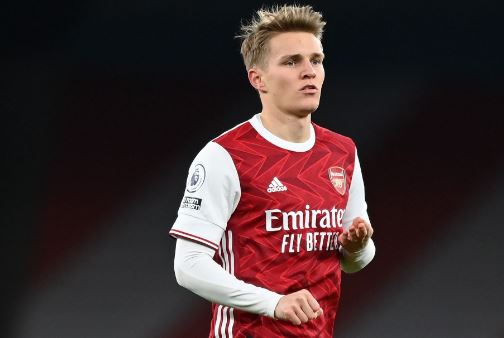
One of the primary responsibilities of any captain is to facilitate team cohesion. Whether leading by example during matches, representing teammates in meetings, or acting as the club’s spokesperson in media interactions, leadership carries numerous duties.
For Martin Odegaard, this aspect of his role comes naturally. He has been accustomed to being the central figure of his team from a young age and relishes the role of a leader whenever he steps onto the pitch. Beyond matchdays, captaining a football club has evolved into a 24/7 commitment, encompassing various roles.

Despite beginning his professional career at the age of 15 and being recognized as a rising star even before joining Stromsgodset at the age of 10, Odegaard had no experience of captaincy at such a young age.
“The first team I ever played for was my local side, Drammen Strong,” Martin explains. “I was considered one of the talented players, but there were a few of us. In fact, my best friend and I stood out. He continued to play until the under-19 age group at the same club where I turned professional, Stromsgodset. However, he eventually stopped playing professionally and continued just for fun. He was a talented player when we were young, and we’re still in touch now; he’s my best friend, so I talk to him all the time.”
Despite garnering national attention at Drammen Strong, even at the young age of six or seven, and clearly being a significant player at the club, he was never given the captain’s armband.
“No, I was never the captain at that first club,” he reveals. “It’s a funny story because my dad was the coach, and he would rotate the captaincy so that everyone had a turn and could experience it. But he never selected me! It was because I was his son that he didn’t choose me. So every other player took their turn, but not me. To be honest, I didn’t mind; I didn’t particularly aspire to be the captain, and it wasn’t a priority for me. But now I find it amusing that he consistently rotated the captain, yet it was never me!”
Martin also learned about teamwork and collaboration when he played bandy as a child, a sport similar to ice hockey but played with a ball. Bandy was popular in his hometown in Norway, but it was a short-lived fascination for him. Football was always his primary focus, and he dedicated all his time to it.
His dedication paid off, as he progressed from Drammen Strong to Stromsgodset and then, at the age of 16, to Real Madrid. He had loan spells at Heerenveen and Vitesse Arnhem in the Netherlands and Real Sociedad in Spain before joining Arsenal, initially on loan, in January 2021.
He was appointed club captain at the beginning of the previous season, but it wasn’t his first experience leading a team. Odegaard had been the captain of the Norway national team since March 2021, so the role at Arsenal wasn’t entirely new to him. Moreover, he credits his strong rapport with the rest of the squad for making the initial months easier.
“I would say I’m quite close to most of the players,” he says. “Perhaps Mo Elneny is one of my closer friends in the team, but it’s hard to pick just one because we have a really tight-knit group here. I connect well with all of them, basically; there’s a great atmosphere in the dressing room among the players and the staff as well.
“We have quite a few gatherings, team barbecues, and similar events where people bring their families. So, we all know each other’s families, and I think that’s really important for building a strong team. There’s a great spirit throughout the entire club.
“For example, Bukayo lives quite near me, so we often get together to watch football or spend time off the pitch. We’re friends off the field as well.”
What, then, does Martin believe are the most critical elements in creating a successful team environment, and what qualities does he, as captain, aim to instill?
“Undoubtedly, you have to fight for each other,” he asserts. “For me, that’s the most essential ingredient. You have to work not only for yourself but also for your teammates. It’s vital to remain united every single day.
“In today’s football, the team unit needs to function even more cohesively than in the past. There was more room for individual brilliance in football previously, whereas in today’s game, you can’t achieve anything unless all 11 players are giving their all. A few years ago, you could have accommodated one or two ‘luxury players’ in the team, but in modern football, that’s simply impossible.
“You need the entire team working together, everyone pulling in the same direction, and the rest of the squad and staff giving their best and working for the team. That, in my view, is the key to success in the modern game.”
As Martin points out, it’s not only the 11 players on the field who contribute to the team’s success. As captain, he has gained a deeper understanding of what transpires behind the scenes and has become more involved in various aspects of the club.
“Yes, that’s a significant part of it,” he acknowledges. “In fact, it’s crucial, and I’ve become more aware of it since taking on the role of captain.
“Most people only see us on the pitch, but there are numerous individuals supporting us from behind the scenes. The effort they put into helping us perform is immense. Moreover, the atmosphere and environment within the club and dressing room must be right, and everyone plays a role in that.
“From the kit men to the staff at the training ground, everything they contribute is crucial for the team’s functioning. Since we spend so much time together, it’s essential for it to be a positive environment. I have to say that at this club, it’s remarkable.”
